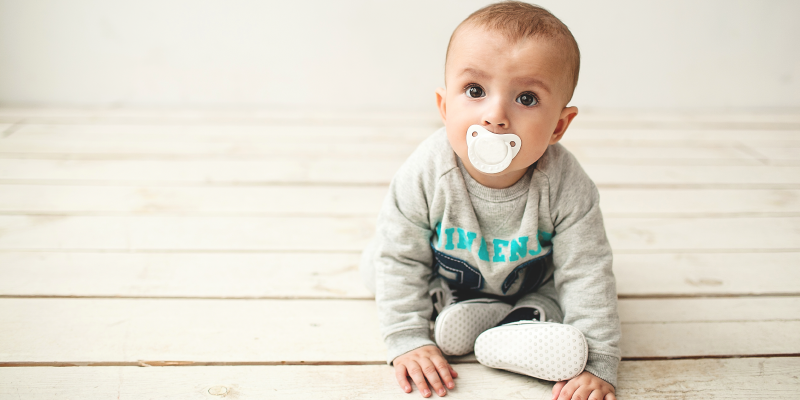
Is a Pacifier Good for Baby? Pros and Cons of Binky Use
For most parents, a pacifier ranks right up there with diaper wipes as a must-have item for baby. Since suckling has a soothing, calming effect, babies are often born already knowing how to suck their fingers or thumbs. And since comforting your baby is one of your top priorities, it’s a given that a pacifier comes in very handy. Especially as you begin to know about newborns. But is a pacifier really good for your baby? Here are some pros and cons with binky use.
The Pros of Using a Pacifier with Baby
Because pacifiers can be the key to keeping your baby content in between feedings, they have been known to soothe a fussy baby, help her fall asleep, act as a distraction or ease discomfort in new surroundings or experiences. There are so many things you aren’t prepared for with motherhood, and a binky can be a life saver. Some studies have also found a positive connection between binky use and SIDS. Babies who use pacifiers at bedtime and during naps have a lower risk of SIDS (sudden infant death syndrome). A pacifier itself does not prevent SIDS, only that there’s a connection between pacifier use and a lower risk of SIDS. And a pacifier habit is usually easier to break than thumb-sucking.
The Cons of Using a Pacifier with Baby
Early use of a binky can sometimes cause nipple confusion, which can interfere with successful breastfeeding. The American Academy of Pediatrics suggests waiting until your baby is nursing regularly and your milk supply is consistent before introducing a binky. A good rule of thumb is to wait until your baby is around 1 month old before adding a pacifier to the mix. Other cons include your baby becoming dependent on a pacifier, an increase in risk for ear infections and a future battle with taking it away.
How to Manage Pacifier Use
Many experts say that a pacifier should not be the first line of defense. If your baby can be soothed with rocking, holding, or cuddling, try those options first. Don’t use a binky as a way to delay feedings, or as a substitute. The best thing to do is offer a pacifier in between feedings when you know she isn’t hungry. Let your baby tell you whether she wants one. If she takes it right away when you offer, great. But if she acts disinterested, don’t try to force her to have one. And if it falls out of her mouth while she’s sleeping, don’t put it back in. The biggest thing to remember is to keep pacifiers clean. Until your baby is 6 months old and her immune system matures, clean it thoroughly by boiling it or running through the dishwasher.
When to Avoid Giving Your Baby a Binky
There are some instances when you should not give your baby a pacifier. If your baby has trouble gaining weight, you should avoid giving her a binky. Does she have trouble nursing? Are you having trouble with your milk supply? These are times to avoid using a pacifier until your baby is established with nursing. You’ll also want to rethink giving your baby a pacifier if she’s having ear infections repeatedly. The last thing to consider is that if you’ve decided you don’t want your baby to use a pacifier at all, you’ll need to alert the hospital before giving birth. Even though a couple of days’ use in the hospital isn’t likely to form a habit, why introduce something there when you don’t intend on using it at home?
For most parents, the benefits to using a binky far outweigh the disadvantages. As with everything parenting, it does boil down to a personal choice. If the peace you experience now justifies the (potential) battle you may have later when it comes time to part ways, by all means do what’s best for your family.
Join the other 100,000+ new parents who love Bitsy Boxes.

